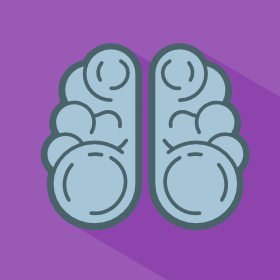
Think of a time when you really needed to sound good. Maybe you wanted to show your teacher how hard you’d studied. Maybe you wanted to show off to a friend with a new song you’d mastered.

Or perhaps you were playing a gig and someone special walked in that you really wanted to impress.
Chances are you thought: ‘It's on! Time to do my best and sound good!’
Did it help? Or were you consumed with thoughts like:
“Is this solo any good? ... I should have timed that better... Shouldn’t my playing be more interesting? ...That sounded like crap... Maybe I should play that fancy jazz chord I learned last week, that’ll impress people...“
It seems the higher the stakes, the louder our inner critic becomes. And why not? Shouldn't we raise the bar when it really matters? Like an athlete pushing his body to its limits at the olympics to win that medal? Just try harder?
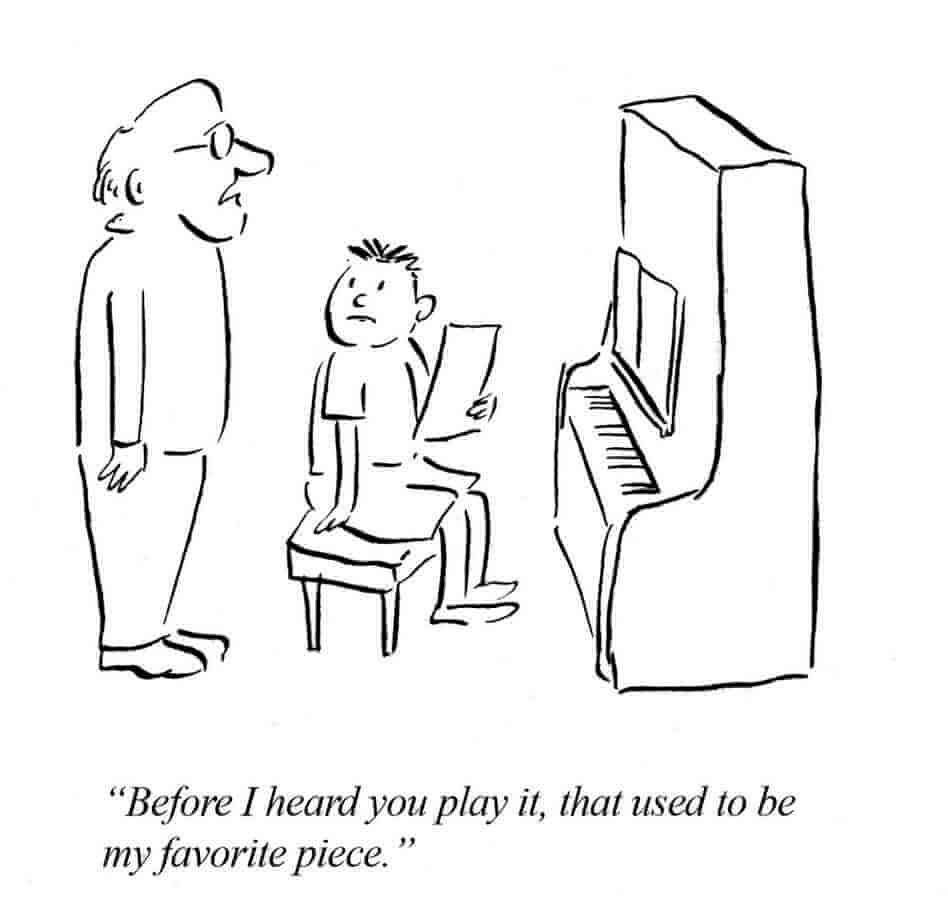 Of course, to avoid scenes like this. Totally realistic fear.
Of course, to avoid scenes like this. Totally realistic fear.
The opposite is true, in my experience. Thoughts keep you from being fully in the moment, keep you from being in 'the zone'. From letting your inner musician take over, allowing you to play from your musical intuition. In this article, I'll share why I think that's the case. I'll also share what's helped me to keep the inner critic at bay and perform better on stage.
Your mind in overdrive mode
Contrast the state of thought-ridden music making with one of those long, late night talks with a close friend. You’re at ease, relaxed, yet fully engaged in the conversation. You might find yourself expressing your thoughts and ideas eloquently and seemingly without effort, in a way that wouldn’t happen if you were in front of a crowd of people giving a speech.
So what’s the difference?
When you’re talking to your friend, you’re not trying to ‘do well’. You don’t care if you mess up, use a wrong word, or mispronounce something. If anything goes wrong, you’ll deal with it. It’s a safe environment and mistakes don’t matter to you.
The more we care about the outcome, the worse we perform.
But for most people, when they’re in front of a crowd, they’re constantly self-monitoring. Their brains are in overdrive mode to double check everything that’s coming out of their mouths to avoid any ‘mistakes’ or saying something stupid. You might have the same experience on a first date or a job interview. Afterwards, you’re exhausted because of the excessive self-monitoring you’ve been doing.
The point is the more we care about the outcome, the more we start monitoring ourselves, and the worse we perform. Whenever we really want to sound smart, be insightful, or express ourselves eloquently, we often don’t. We sound forced and unnatural and feel uncomfortable. And we're drained afterwards.
Do not care whether you live or die
So that’s music, public speaking, job interviews and first dates. But let’s up the stakes a bit. Say that you’re a sword fighter. If you perform badly, it doesn’t just mean it’ll be slightly embarrassing or that you’ll miss out on romance or a job. It means you’re dead. Surely, that would be a situation where you’d want to focus a bit on not dying, right? Nineties movies have taught me differently.

In the film ‘First Knight’, Sir Lancelot explains the secret to sword fighting: “You must not care whether you live or die”. His point? Every part of your mind that’s focused on surviving is a part that’s not focused on fighting. Paradoxically, the less you care about surviving, the greater the chance you’ll live. Translated to music: it’s a waste of energy and mental capacity to focus on not-sucking. The less you think, the better you play.
This is one of the greatest challenges of being a musician. We want to sound good, but in order to do so, we have to not care about sounding good.
You might not know it, but you probably have a lot of experience with such a state of mind. You might be jamming with some friends, or just noodling by yourself. The stakes are low. You’re not thinking too much, you’re just letting ideas flow. You’re playing. Some people might say: you’re letting the music play itself.
This is the state you want to be in when you’re performing music. All critical thoughts are suspended until further notice. Charles Limb, a researcher from John Hopkins University, has done some research that supports this idea. He put jazz musicians in an MRI-scanner while they were improvising on a midi-keyboard.
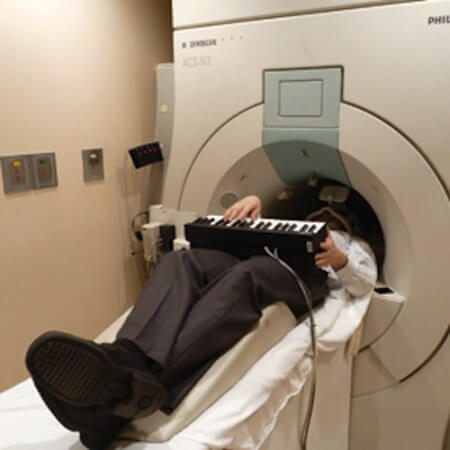
What did he find? The part of the brain that’s involved in self-monitoring switches off completely. At the same time, the part that we use to express ourselves switches on. This suggests that when we want to be creative, to really ‘play’, we have to turn off the part of us that’s monitoring our every move and just go with the flow.
Practicing on stage
That might sound funny. Shouldn’t we be critical of our performance? Look for areas of improvement? Work hard to do better? Of course, we should do all that, but it’s a matter of the right moment. We shouldn’t assess our playing while we’re performing, but when we’re practicing. At a moment when we can actually do something about it. All those critical thoughts that are holding you back on stage, are actually really useful during practice.
Instead, we often decide that for some reason a performance is the perfect time to assess our strengths and weaknesses. Imagine your inner critic being a friend standing a few feet from the stage and yelling his critiques at you. “YOUR TIMING IS OFF.... BOOOORING.... A MISTAKE! YOU’RE SUCH A TALENTLESS HACK!” Doesn’t seem very helpful. Everyone there would be thinking ‘geez, what a d*ck...’ It’s pretty bizarre what we subject ourselves to when performing.
— The Simpsons (@simpsons_vids) May 8, 2016
Your inner critic is often 'not very nice' to you too...
But when we sit down to practice at home, our inner critic is much less vocal. We often just noodle. We let ideas flow. We play. In other words: You’re practicing when you should be playing, and you’re playing when you should be practicing.
Three steps to doing better
So. All we need to do is stop caring about sounding good and simply play without thinking and self-monitoring. Easy right? Sadly, not so much. The thoughts aren’t going to go away just because you know they aren’t helping you. There's no easy off-switch. But there are a few ways to deal with thoughts that have helped me, based on two psychological schools of thought and the bright idea of a football coach. Together, they form three steps that can help you to get in the zone on stage and perform better. Disclaimer: I am not an expert in psychology. I'm just sharing what I've learned in the last couple of years and what has helped me perform better.
Step 1: Dissect your thoughts
Just because you’re thinking something, doesn’t make it true. Yet interestingly, people tend to accept thoughts at face value. We're not used to looking for evidence behind the things that pop into our mind. Cognitive Behaviour Therapy (CBT) teaches us not to trust thoughts and to challenge them. It's about realising that thoughts are just thoughts and there’s no need to take them seriously.
However, what you’re thinking can have a profound effect on both how you feel and on your behaviour. On stage, you might catch yourself thinking ‘I should be playing better’. This in turn makes you feel bad, which makes you play worse... Which again makes you think ‘I should be playing better!’ And so on...
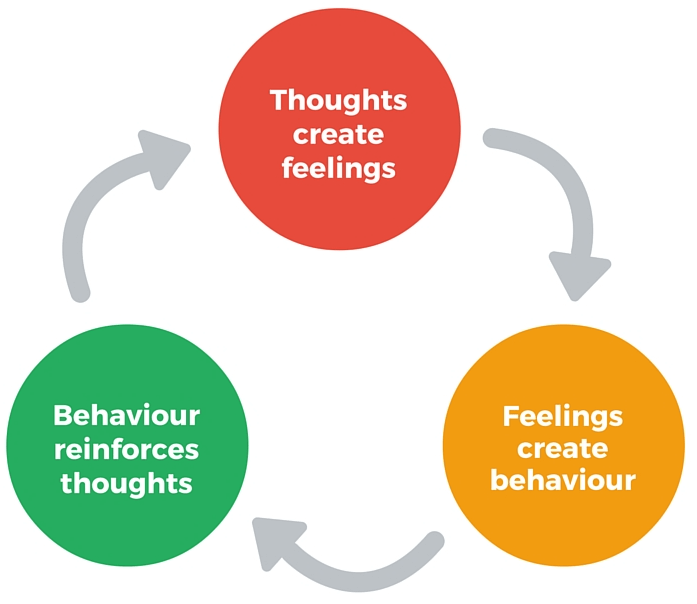
Every thought we have is just an interpretation of events. Something that your friend said, a look your boss gave you, being stuck in traffic... Any event is neutral in itself, but our thoughts make it positive or negative. Being stuck in traffic can be an intensely annoying experience that ruins your mood. But it can also be an opportunity to listen to that awesome podcast or new record you hadn’t gotten to yet. It all depends on your thoughts.
The goal of CBT is to recognise and challenge 'automatic negative thoughts' and to realise they often don’t make any sense. They tend to be either unproven or untrue. There are several so called ‘cognitive distortions’ that you can learn to recognise. These distortions are ways in which we take an event and transform it into something overly negative.
Recognising those distortions allows you to see how many automatic negative thoughts make no sense. Which breaks the vicious circle where bad thoughts lead to worse performance. Here are five of the most important distortions to be on the lookout for.

A. All or nothing thinking
I get it. You love great music and your standards are high. But perfectionism has a dark side. It can make you evaluate your playing in extreme, black-or-white categories. There’s good and there’s bad, and nothing in between. You might make a mistake and immediately conclude 'This concert is ruined!' or even ‘I’m a horrible musician.’
Perfectionism can make you evaluate your playing in extreme, black-or-white categories.
But life is rarely completely one way or the other. No one is either absolutely brilliant or totally stupid. Completely attractive or 100% ugly. Just look at the floor of the room you’re in now. Is it perfectly clean? Is every inch of it piled high with dust and dirt? Or is it partially clean? Absolutes do not exist in this world.
You might have a gig where you think ‘this is the worst I’ve ever played...’ But what feels like your worst playing now, is probably still way better than your best playing a few years ago. Also, I can’t tell you the number of times where I thought a show sucked, but people came up to me afterwards to tell me they loved it... Realise that you know how good the show can be, but audience members don’t. They just listen and enjoy it for what it is without your expectations.

B. Mental Filter
Mental filtering occurs when you pick out one negative detail, focus on it exclusively, and thus perceive the whole situation as negative. It might be a few audience members leaving, despite the dozens of people listening intently. Or that one mistake you made, despite the rest of the song being played perfectly. It’s like a drop of ink that darkens the whole cup of water.

C. Jumping to conclusions: Mind Reader
You’re in the middle of a gig, enjoying yourself and suddenly you see a guy in the front row letting out the biggest yawn. He was up all night on a wild fling, but of course you don’t know that. You can only think: “The audience thinks we’re a complete bore!” You’re jumping to a conclusion that is totally unjustified based on the facts of the situation.

D. Magnification
Many of our negative thoughts are gross exaggerations. That mistake you made that felt HUGE to you? Believe me, it’s crazy how many mistakes you can make that no one will hear... Even if people suspect you made a mistake, they don’t care. Folks come out to see a show to have a good time, not to listen closely and detect any mistakes the musicians might be making.
Despite all that, you might think: “My god, I made a mistake! How awful! How horrible! The word will spread like wildfire! My reputation is ruined!” You’re magnifying the gravity of a tiny thing. Magnification occurs when you exaggerate the importance of your mistakes, errors and imperfections. This is also called ‘catastrophising’ because you turn commonplace negative events into nightmarish monsters.

E. Should Statements
"I should be playing more interesting things. I should totally nail this solo. I should not make any mistakes..." Should-thoughts are when you remind yourself of what you should be doing for some reason. You might try to use it to motivate yourself, but you just end up feeling pressured instead. Realise that there isn’t necessarily any reason that you should do anything, and if there was, constantly reminding yourself of it, is not an effective way of reaching that goal.
Note: This explanation was largely paraphrased or quoted directly from David Burns' brilliant book ‘Feeling Good’ (p. 32-42). If you are a human being, I highly recommend you read it.Step 2: Don't engage thoughts
As we've seen, many thoughts are irrational and don’t make sense. Realising this helps diminish the impact of such thoughts. Over time you'll also think less of those automatic, negative thoughts, but they won't disappear altogether. That's where this second step comes in. It takes a different approach to thoughts and has its roots in mindfulness.
This school of thought argues that engaging thoughts is already taking them way too seriously. Thoughts are meaningless. The idea is to acknowledge a thought has popped up, decide not to engage it and just it drift by. You don’t even have to think ‘that makes no sense, because...’. Just let it be. Whenever a thought comes up, gently bring your attention back to the music. Listen to what you’re hearing, and play.
Imagine all your negative thoughts are collected in a book. Normally, you might keep the book right in front of your eyes, obstructing your view of the world. This approach is about lowering the book from in front of your face, and placing it in your lap instead. The thoughts will still be there, but they’re not taking center stage. You’re not focusing on them. They’re no longer the primary focus of your attention. In short, you want to change your relationship to your thoughts. I know too little about meditation to say anything definite on the subject, but found this video illuminating:
It's great to be able to keep yourself from engaging thoughts on stage. When automatic thoughts pop into your head, the challenge is to pay little to no attention to those thoughts. When you notice you're distracted, just bring your attention back to the music. Of course, this is a skill and like any skill it requires practice, as we'll see in the next step.
Note: For more info, check out this episode of invisibilia, where I got the book metaphor.
Step 3: Practice ‘fake’ high-stakes situations
One of the most excruciatingly tense and nailbiting moments in football is the penalty shootout. Two teams have played for ninety minutes, then another thirty, but still end up tied. So each team takes five penalty kicks. The team that scores the most goals wins.
Scoring that goal from eleven meters should be no problem for a professional football player. With enough speed and proper aim, it’s nearly impossible for the goalkeeper to save that ball. Still, one out of four penalties is missed. It’s the mental pressure that makes it so difficult.
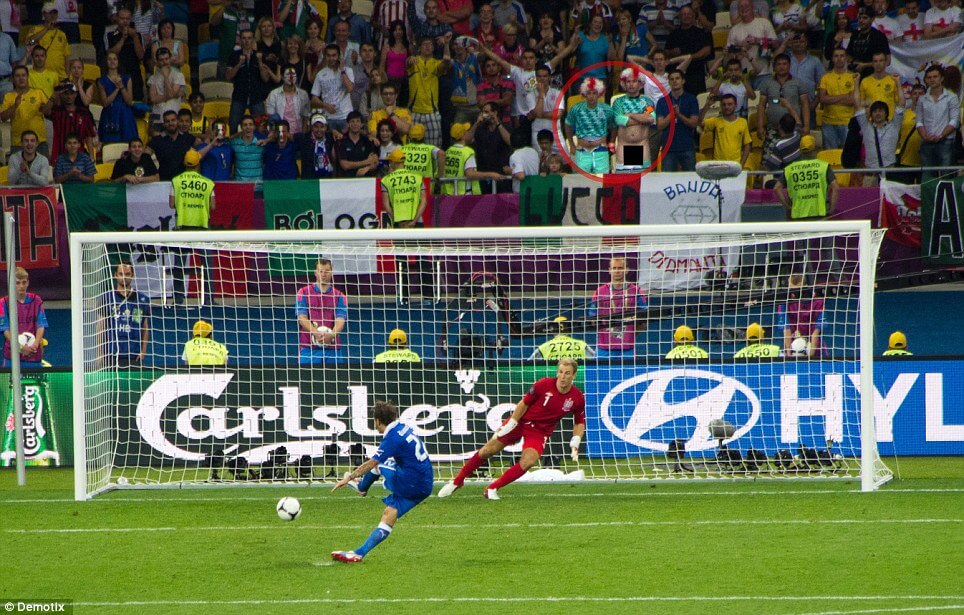 Distractions, you say?
Distractions, you say?
Many trainers assume that there’s no way to train penalties. You can’t recreate the intense pressure of walking across half a football field, the roaring of the crowd all around you, putting the ball on the penalty dot, looking the goalie in the eye, waiting for the referee to blow the whistle, and running up to the ball to score.
It's true, a training situation just isn’t the same. But a tiny part of the pressure can be recreated. In the match you only get one shot. So one trainer had his entire team take just one penalty after practice. Just one. Score it. No do-overs.
You can create all kinds of situations where the stakes are slightly higher than ‘just practicing’ at home too. Think of it as a training grounds where you can practice performing under pressure and dealing with automatic thoughts. Here's a few approaches you can try:

If you've been practicing a song for a while, say to yourself: “I’m going to perform the piece now, and I have just one shot.” Just like the penalty kick. Try to nail the song in that one go.
 If you've been practicing a song for a while, say to yourself: “I’m going to perform the piece now, and I have just one shot.” Just like the penalty kick. Try to nail the song in that one go.
If you've been practicing a song for a while, say to yourself: “I’m going to perform the piece now, and I have just one shot.” Just like the penalty kick. Try to nail the song in that one go.

To increase the tension record yourself. You don't need anything fancy. Your phone or the camera on your computer will do fine. (Though if you want to increase the pressure and create a home recording studio, here are some tips!) Try to play the 'perfect' version of the song, without any mistakes. The great thing about this exercise is that as you get towards the end you start thinking thoughts like "No mistakes so far! I've got to make it!"
 To increase the tension record yourself. You don't need anything fancy. Your phone or the camera on your computer will do fine. (Though if you want to increase the pressure and create a home recording studio, here are some tips!) Try to play the 'perfect' version of the song, without any mistakes. The great thing about this exercise is that as you get towards the end you start thinking thoughts like "No mistakes so far! I've got to make it!"
To increase the tension record yourself. You don't need anything fancy. Your phone or the camera on your computer will do fine. (Though if you want to increase the pressure and create a home recording studio, here are some tips!) Try to play the 'perfect' version of the song, without any mistakes. The great thing about this exercise is that as you get towards the end you start thinking thoughts like "No mistakes so far! I've got to make it!"

You can also prepare for a live performance during band practice. To get everyone focused say “alright, let’s play this for real now." Put down your instruments and pretend that you're entering the stage and want to wow the audience with your opening song. Play the rest of the set as you plan to do it live. For most bands, that means no talking to each other between songs! Also, there's no stopping in the middle of the song when something goes wrong. Solve any problems like you'd do live! Ask one or two friends to come and watch, if that helps everyone to get into the 'this is for real' mindset.
 You can also prepare for a live performance during band practice. To get everyone focused say “alright, let’s play this for real now." Put down your instruments and pretend that you're entering the stage and want to wow the audience with your opening song. Play the rest of the set as you plan to do it live. For most bands, that means no talking to each other between songs! Also, there's no stopping in the middle of the song when something goes wrong. Solve any problems like you'd do live! Ask one or two friends to come and watch, if that helps everyone to get into the 'this is for real' mindset.
You can also prepare for a live performance during band practice. To get everyone focused say “alright, let’s play this for real now." Put down your instruments and pretend that you're entering the stage and want to wow the audience with your opening song. Play the rest of the set as you plan to do it live. For most bands, that means no talking to each other between songs! Also, there's no stopping in the middle of the song when something goes wrong. Solve any problems like you'd do live! Ask one or two friends to come and watch, if that helps everyone to get into the 'this is for real' mindset.

To up the stakes slightly more, record your performance. Even if you don't plan to use the recording, for some reason this makes playing the song more exciting and more 'real'. As a bonus, if you use a camera, you can watch your band 'performing', which is a great starting point to improving your stage presence and your show.

To up the stakes slightly more, record your performance. Even if you don't plan to use the recording, for some reason this makes playing the song more exciting and more 'real'. As a bonus, if you use a camera, you can watch your band 'performing', which is a great starting point to improving your stage presence and your show.
Playing in the zone
Learning to deal with your thoughts on stage isn't simple. But the benefits are huge. The tension and excitement of performing are like a bottleneck. It only lets out a small part of what you’re capable of. By learning how to deal with your thoughts, you’ll be making that bottleneck as wide as possible.
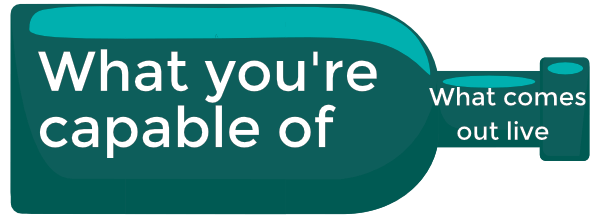
As you get better at this, you’ll notice that more and more of your playing ability will come through on stage. You’ll be able to focus on the music without caring about the ‘right notes’, mistakes or your ego. Ideally, you won’t be thinking anything. Playing in that state, being in ‘the zone’ is an amazing experience.
How to get started
Phew, that was a lot of information. I've summarised the most important points and the essential exercises in a brief, two page cheat sheet. Feel free to get that!
What's the next step? Being aware of what’s happening is the first step to getting more control. So I'd suggest you create one of the fake high stakes situations and see what happens. What are you thinking while playing? Do those thoughts make sense? Can you disengage from thoughts?
Anything that helps you to perform? I'd love to hear from you about any tips, techniques or tricks you use to keep the inner critic at bay and get in the zone!
Become an All Access Member
Get access to All Courses and...

Train Your Ears
Ear training should help you in everyday playing. So instead of doing dry exercises, you’ll be figuring out real music by ear. So you’ll develop your ears, while learning tons of cool songs.

Learn Music Theory
Take super practical theory lessons, made specifically for guitar players. They’ll help you to navigate the fretboard, communicate with band mates and understand how the music you love is constructed.
Develop your Musicality
All courses on StringKick focus on tapping into and developing the musician inside you. By strengthening these skills, your playing will start to feel easier and more natural.



![Title image for How to Write a Song [Step-by-Step Guide]](https://www.stringkick.com/wp-content/uploads/2020/04/Songwriting-Title-Image-v1.png)


